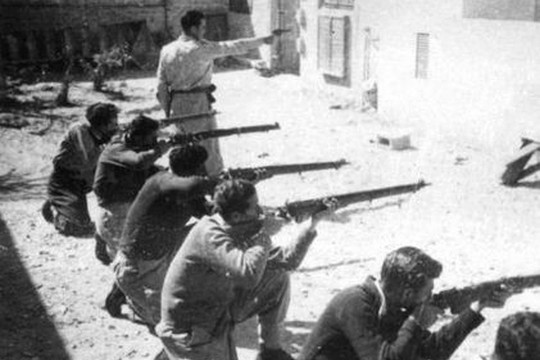Ruth Reznik was only 14 when she joined a Zionist militia and took up arms against the British in Palestine. Now, she says, is the time to understand why Gazans are taking up arms against Israel.
By Ruth Reznik (translated by Sinewave)
I was drafted to the Irgun, a pre-state, right-wing Zionist militia, in the summer break after eighth grade, after I voiced my intention to enlist with either the Irgun or with the Lehi. As it happened, the representatives of the Irgun were the first to meet me. I wasn’t even 14 at the time, but the strong desire to join the underground resistance grew ever since the hanging of Eliahu Hakim and Eliahu Beit-Zuri, two Lehi men who were executed by the British in Cairo for the murder of the Baron Moyne (responsible for the 1941 Struma disaster, which claimed the lives of over 900 Jewish refugees in 1941). Hakim and Beit-Zuri were sent to the gallows on March 22, 1945.
At the time, my resolve to join the resistance against the British grew as more and more members of the resistance were handed death sentences, and as the gates to the country were closing in the face of waves of Jewish refugees from Europe. I decided it was time to become part of the fight against the British occupier.
Even though I was only a teenager, the danger did not deter me. I sat through nights full of resistance theory; entire evenings were spent getting familiar with how to use light firearms like Stens and Brens. We also learned how to identify gun calibers in the dark as well as different kinds of grenades and explosives. During vacations, we underwent live fire training and ground exercises. The lessons took place in a kindergarten located in Tel Aviv’s Florentine neighborhood, and in 1947, Arab gunmen were already sniping at nearby Hertzl street from Jaffa’s Hassan Bek Mosque. I took part in the funerals of fallen Irgun members who died in the conquering of the Menashiya neighbourhood in Jaffa. And in May 1948, the State of Israel declared its independence and the Irgun was disbanded. At age 15-and-a-half I was already a retired resistance fighter.
To this day, I understand the need of an occupied people to resist their occupier, and establish underground resistance forces until they gain their sovereignty. The same happened with oppressed peoples in America, Ireland, Northern Ireland, Kenya, South Africa and many other countries.
I raise this issue now in order to try and show that the occupation of Gaza will bring many deaths among our soldiers. 30, 300, 3,000, 300,000? And what about the tens of thousands who will come home wounded and shell-shocked? We cannot erase the hatred toward the occupiers. I still remember how Shoshana Damari’s simple song Anemones made the Queen’s soldiers go crazy.
Suppose we manage to re-occupy Gaza again, only to evacuate it years later. Will we not create the next generation of terrorists with our own hands? My suggestion is that the Israeli government remember Egyptian President Anwar Sadat. One year before he arrived at the Israeli Knesset, he gave a famous television interview in which he was asked about the possibility of peace with Israel. He answered: “A thousand years will pass before we make peace with Israel… rivers of blood pass between us… but a wise and daring man makes brave decisions and is not dragged down by hot heads.”
I remind you that two of the leaders of anti-British resistance movements, Menachem Begin and Yitzhak Shamir, became Israeli prime ministers. Nelson Mandela, who was a prisoner of the apartheid South African government, was the man who, in his wisdom, prevented terrible bloodshed in his country.
Ruth Reznik is chair of No2Violence NGO and winner of the Israel Prize for special contribution to society and the nation. The post was first published on the No2Violence website. You can also read it in Hebrew on Local Call.
Related:
Gaza dispatch: Why the people support Hamas
‘Ending the siege is not a Hamas demand – it is a Palestinian one’


